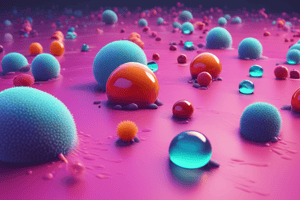Podcast
Questions and Answers
What are the four critical macromolecules that all microorganisms require to synthesize?
What are the four critical macromolecules that all microorganisms require to synthesize?
- Proteins, Carbohydrates, Lipids, Nucleic Acids (correct)
- Starch, Glucose, Fats, DNA
- RNA, DNA, ATP, Chlorophyll
- Vitamins, Minerals, Fiber, Enzymes
What is the main difference between fastidious and nonfastidious microorganisms?
What is the main difference between fastidious and nonfastidious microorganisms?
- Fastidious microorganisms rely heavily on external sources for organic compounds. (correct)
- Nonfastidious microorganisms require complex media for growth.
- Fastidious microorganisms do not need nutrients for growth.
- Nonfastidious microorganisms are difficult to cultivate in the lab.
Why is cultivation of fastidious microorganisms generally more challenging than cultivation of non-fastidious microorganisms?
Why is cultivation of fastidious microorganisms generally more challenging than cultivation of non-fastidious microorganisms?
- Nonfastidious microorganisms are sensitive to selective media.
- Fastidious microorganisms require specific nutrients that may be difficult to provide. (correct)
- Fastidious microorganisms reproduce at a slower rate.
- Nonfastidious microorganisms are harder to grow in undefined media.
What type of media is commonly used to cultivate fastidious microorganisms?
What type of media is commonly used to cultivate fastidious microorganisms?
What is the purpose of selective media in microbiology?
What is the purpose of selective media in microbiology?
Why do microbiologists use defined media in some cases?
Why do microbiologists use defined media in some cases?
What happens if a single necessary chemical is absent in the growth medium for a fastidious microorganism?
What happens if a single necessary chemical is absent in the growth medium for a fastidious microorganism?
How do undefined media differ from defined media?
How do undefined media differ from defined media?
Flashcards are hidden until you start studying
Study Notes
Nutritional Requirements of Microorganisms
- Microorganisms require nutrients to synthesize proteins, carbohydrates, lipids, and nucleic acids.
- Bacteria exhibit diversity in synthesizing and metabolizing these macromolecules.
Types of Microorganisms
- Fastidious microorganisms rely heavily on the environment for "ready-made" molecules.
- Non-fastidious microbes do not heavily rely on external sources for organic compounds or nutrients.
Cultivation of Microorganisms
- Knowledge of a microorganism's nutritional requirements is crucial for successful cultivation in the lab.
- The absence of a single chemical can prevent growth in fastidious microorganisms.
- Cultivation of fastidious microorganisms is generally more difficult than cultivating non-fastidious microorganisms.
Types of Media
- Undefined media contain ingredients derived from plant, fungi, or animal tissue extracts, are nutrient-rich, and support growth of a wide variety of microorganisms.
- Defined media contain exact amounts of purified ingredients and support a smaller range of microorganisms.
- Selective media, also known as additional ingredients, inhibit certain microorganisms and/or encourage the growth of microbes, allowing for pure cultures.
- Selective media can select based on whether a microbe is Gram-positive or Gram-negative.
Studying That Suits You
Use AI to generate personalized quizzes and flashcards to suit your learning preferences.




